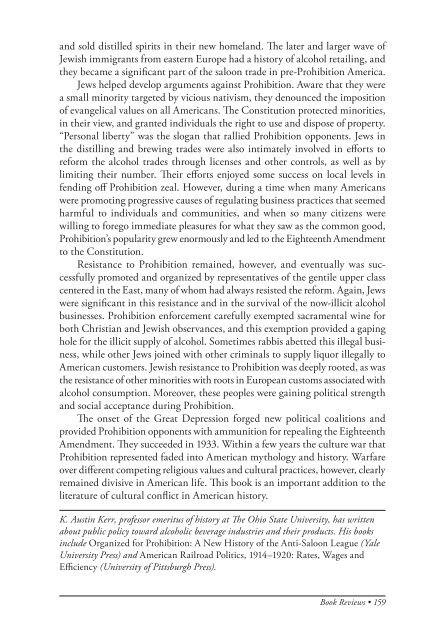American Jewish Archives Journal, Volume 64, Numbers 1 & 2
American Jewish Archives Journal, Volume 64, Numbers 1 & 2
American Jewish Archives Journal, Volume 64, Numbers 1 & 2
You also want an ePaper? Increase the reach of your titles
YUMPU automatically turns print PDFs into web optimized ePapers that Google loves.
and sold distilled spirits in their new homeland. The later and larger wave of<br />
<strong>Jewish</strong> immigrants from eastern Europe had a history of alcohol retailing, and<br />
they became a significant part of the saloon trade in pre-Prohibition America.<br />
Jews helped develop arguments against Prohibition. Aware that they were<br />
a small minority targeted by vicious nativism, they denounced the imposition<br />
of evangelical values on all <strong>American</strong>s. The Constitution protected minorities,<br />
in their view, and granted individuals the right to use and dispose of property.<br />
“Personal liberty” was the slogan that rallied Prohibition opponents. Jews in<br />
the distilling and brewing trades were also intimately involved in efforts to<br />
reform the alcohol trades through licenses and other controls, as well as by<br />
limiting their number. Their efforts enjoyed some success on local levels in<br />
fending off Prohibition zeal. However, during a time when many <strong>American</strong>s<br />
were promoting progressive causes of regulating business practices that seemed<br />
harmful to individuals and communities, and when so many citizens were<br />
willing to forego immediate pleasures for what they saw as the common good,<br />
Prohibition’s popularity grew enormously and led to the Eighteenth Amendment<br />
to the Constitution.<br />
Resistance to Prohibition remained, however, and eventually was successfully<br />
promoted and organized by representatives of the gentile upper class<br />
centered in the East, many of whom had always resisted the reform. Again, Jews<br />
were significant in this resistance and in the survival of the now-illicit alcohol<br />
businesses. Prohibition enforcement carefully exempted sacramental wine for<br />
both Christian and <strong>Jewish</strong> observances, and this exemption provided a gaping<br />
hole for the illicit supply of alcohol. Sometimes rabbis abetted this illegal business,<br />
while other Jews joined with other criminals to supply liquor illegally to<br />
<strong>American</strong> customers. <strong>Jewish</strong> resistance to Prohibition was deeply rooted, as was<br />
the resistance of other minorities with roots in European customs associated with<br />
alcohol consumption. Moreover, these peoples were gaining political strength<br />
and social acceptance during Prohibition.<br />
The onset of the Great Depression forged new political coalitions and<br />
provided Prohibition opponents with ammunition for repealing the Eighteenth<br />
Amendment. They succeeded in 1933. Within a few years the culture war that<br />
Prohibition represented faded into <strong>American</strong> mythology and history. Warfare<br />
over different competing religious values and cultural practices, however, clearly<br />
remained divisive in <strong>American</strong> life. This book is an important addition to the<br />
literature of cultural conflict in <strong>American</strong> history.<br />
K. Austin Kerr, professor emeritus of history at The Ohio State University, has written<br />
about public policy toward alcoholic beverage industries and their products. His books<br />
include Organized for Prohibition: A New History of the Anti-Saloon League (Yale<br />
University Press) and <strong>American</strong> Railroad Politics, 1914–1920: Rates, Wages and<br />
Efficiency (University of Pittsburgh Press).<br />
Book Reviews • 159
















